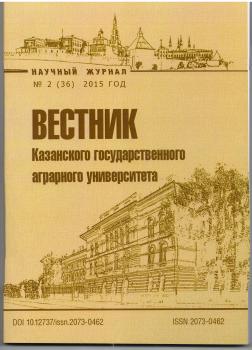Russian Federation
As we know, the level of organization and efficiency of agricultural production depends on provision of highly qualified specialists. Nowadays, we oversee a shortage of qualified personnel in the agribusiness of the Republic of Tatarstan. Increasing the agricultural products output, on the one hand, and lack of managerial staff in the agricultural enterprises, on the other hand, cause increasing the loading on industry experts, which drastically reduces their motivation to work and efficiency of industrial process control. All this leads to a decrease in efficiency of agricultural production. Studies show, that agribusiness personnel security system depends on their training and retraining in the higher educational institutions, on focused work of personnel services at various levels, on the level of wages, on satisfaction of specialists in social and economic conditions of labor, on output and load to one specialist. Agricultural enterprises do not use standard method for determining the needs of industry professionals. According to nominally - standard method in 2012, the plant industry needed in 1533 agronomists, but according to the information of personnel department of the Ministry of Agriculture of the Republic only 634 agronomists worked in the Republic, that was 41.3% of the estimated quantity. This has led to an expansion of the load on a single specialist, which reduced the efficiency of management, timely execution of processes for organizational reasons and low yields. The loss of crop production averaged in thе Republic was 648 863.600 rubles, that is equivalent to 119 276.3 tons of grain. The shortage of highly qualified personnel in rural areas, their low fixability, degradation qualitative and quantitative human capacity can be eliminated by the development and adoption at the federal and regional levels the targeted program of agribusiness staffing and develop guidelines and criteria for personnel policy. Social and economic activities, that promote security personnel include: material incentives increase, improvement of living conditions, the introduction of new forms of work organization, compliance labor intensity, professional and qualitative promotion of workers. The studies have shown that: an objective approach at making appointments to executive positions; use of personnel reserve; introduction of innovative technologies into the production; improvement of specialists remuneration systems; creation of a single automated system of personnel monitoring in agribusiness; improvement living conditions and higher wages of specialists - are the main measures, facilitating to consolidation of professionals in rural areas. All these measures will have maximum impact and benefit only in joint implementation by the owners of agricultural enterprises and government agribusiness agencies.
personnel, training, efficiency, labor cost, nominally-regulatory method.
Для производства материальных благ в сельском хозяйстве каждому хозяйствующему субъекту для намеченных размеров и объемов производства необходимо иметь в достаточном количестве производственный потенциал. Основой производственного потенциала являются трудовые ресурсы, с помощью которых осуществляется целенаправленная деятельность по эффективному использованию остальных элементов производственного потенциала: капитала, в виде основных и оборотных средств и земли. При организации коллектива работников производительному труду, залогом высокой результативности является наличие в хозяйствующих субъектах разного уровня квалифицированных руководителей и специалистов. От обеспеченности высококвалифицированными специалистами зависит уровень организации и эффективность сельскохозяйственного производства. Однако, на местах наблюдается недостаток квалифицированных кадров, низкая обеспеченность ими сельскохозяйственных предприятий и отдельных сфер обслуживающих отраслей [5, с.26-29; 6, с.15-19.]. В связи с этим, рядом авторов отмечается необходимость разработки программы кадрового обеспечения АПК России и подготовки кадрового потенциала, способного к эффективной работе в условиях ВТО [1, с.18; 3, с.60-64].
Анализ и обсуждение результатов исследований. Обеспеченность всех сфер агропромышленного комплекса, в частности сельского хозяйства, специалистами различной категории зависит от целенаправленной и слаженной работы кадровых служб отраслевых министерств и ведомств, районных управлений сельского хозяйства, сельскохозяйственных предприятий и организаций. На обеспеченность кадровым потенциалом АПК, значительное влияние оказывает подготовка их в профильных ВУЗах соответствующих субъектов России.
Подготовку кадров с высшим образованием для сельского хозяйства Республики Татарстан, осуществляют два высших учебных заведения: Казанский государственный аграрный университет (КГАУ) и Казанская государственная академия ветеринарной медицины имени Н.Э. Баумана (КГАВМ). Казанский государственный аграрный университет занимается подготовкой бакалавров и специалистов для отраслей растениеводства (агрономы, садоводы, овощеводы, агрохимики и др.), обслуживающих производств – механизации и сервисного обслуживания (инженера, механики), вспомогательных производств (технологи по производству и переработки продукции), а также финансово-экономических служб (бухгалтера, бакалавры по экономике) и управления (менеджеры). Казанская государственная академия ветеринарной медицины имени Н.Э. Баумана готовит специалистов и бакалавров для отраслей животноводства (зоотехники, ветеринарные врачи и другие). В официальных сайтах данных учебных заведений размещена информация о распределении и трудоустройстве выпускников, обучавшихся по очной форме обучения за счет средств федерального бюджета [4]. Как показывают данные таблицы 1, выпускники Казанского ГАУ в основном трудоустраиваются по направлениям и полученным специальностям. Так, из обученных за счет средств федерального бюджета, всего по специальности работают в среднем около 73% и данный показатель за последние три года, имеет тенденцию роста (табл.1).
1. Kozlov A.V. Gotovy li kadry sel´skogo khozyaystva k vyzovam VTO?/ A.V Kozlov, B.P. Pankov //APK: ekonomika, upravlenie. №7. - 2012 g. s.18
2. Mukhametgaliev F.N. Spravochnik spetsialista agropromyshlennogo kompleksa /F.N. Mukhametgaliev, N.M. Yakushkin, F.N. Avkhadiev, I.G. Gaynutdinov, D.V. Safina, L.F. Mukhametgalieva - Kazan´: Izd-vo KPFU.- 2011
3. Oleynik A.S. Kak reshat´ kadrovuyu problemu na predpriyatiyakh promyshlennogo svinovodstva: opyt agrokholdinga «Kuban´» /A.S. Oleynik. //Ekonomika sel´skokhozyaystvennykh i pererabatyvayushchikh predpriyatiy. №7.- 2012g.-s.60-64
4. Ofitsial´nye sayty Kazanskogo GAU, KGAVM. Elektronnyy resurs. Svobodnyy dostup: http://kazgau.ru/obrazovanie/trudoustrojstvo/itogi_trudoustrojstva_vypusknikov_2011g/; http://www.ksavm.senet.ru/ru_anketa.php; http://kazgau.ru/obrazovanie/trudoustrojstvo/vakansii/
5. Taymaskhanov Z.Kh. Kadrovyy potentsial sel´skogo khozyaystva regiona /Taymaskhanov Z.Kh., Israilov M.V.//APK: ekonomika, upravlenie. - №2. - 2013 g.- s.26-29
6. Sharipov S.A. Nauchnoe, kadrovoe i informatsionnoe obespechenie regulirovaniya zemel´nykh otnosheniy /S.A.Sharipov, I.G. Gaynutdinov. //APK: ekonomika, upravlenie. - 2009 g. - № 6, str.15-19.
7. Kiryushin V.I. Sovershenstvovanie sistemy nauchnogo, innovatsionnogo i kadrovogo obespecheniya APK.// Dostizheniya nauki i tekhniki APK. 2013. № 9. S. 3-7.
8. Khisamutdinov A.S. Rol´ i mesto strategicheskogo upravleniya personalom v korporativnoy strategii kompanii. //Vestnik Kazanskogo gosudarstvennogo agrarnogo universiteta. 2009. T. 11. № 1. S. 81-83.





